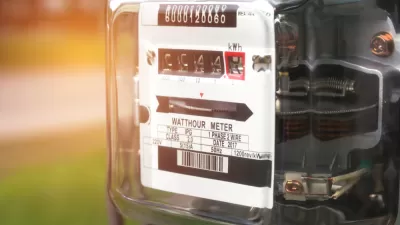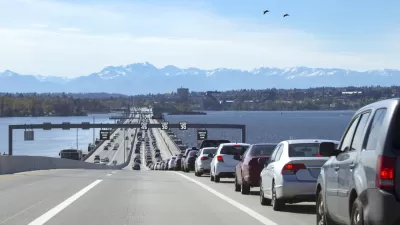A GOP bill to double the nation's lowest state gas tax was approved by the state Senate on Monday. If approved by the House and signed by Gov. Dunleavy, who is facing a possible recall election, the excise tax would jump to 16 cents-per-gallon.

Senate Bill 115, sponsored by Sen. Click Bishop, R-Fairbanks, "who has worked for six years on the idea," cleared the Senate on a 12-5 vote on Monday, reports James Brooks for Anchorage Daily News on March 3. It faced bipartisan opposition, though for different reasons.
The decision, which must be approved by the House of Representatives and Gov. Mike Dunleavy before it becomes law, also raises the state’s marine fuel tax and increases registration fees for electric and plug-in hybrid vehicles. It does not change taxes on home heating fuel, jet fuel or aviation gasoline.
Transportation and trucking companies testified in favor of the increase, saying poorly maintained roads have cost an extraordinary amount in vehicle maintenance.
"Alaska’s motor fuel tax rates have not changed for 50 years, since May 1970," according to Bishop's office. "With this increase, Alaska would still have the lowest marine fuel tax rate in the nation and the ninth lowest highway fuel tax rate."
No 'lockbox'
Sen. Shelley Hughes, R-Palmer, voted against the bill due to the lack of a "transportation lockbox" that would ensure revenue goes to road maintenance and not be diverted to other uses, although Bishop insisted that it would be directed to roads.
Brooks added that "[g]as tax revenue has been trending downward, according to state figures. That decrease, coupled with budget cuts, has forced the state to close road maintenance stations."
Hughes does have a point, though. "Alaska’s constitution prohibits dedicated funds; a future version of the Alaska Legislature could use fuel tax money for another purpose," noted Brooks. According to the Eno Center for Transportation, "Alaska is the only state to not have statutory or constitutional restrictions on transportation revenue diversion."
While revenues go to the General Fund, they are deposited into specified accounts based on the fuel types, according to the Alaska Department of Revenue - Tax Division.
The Tax Division deposits revenue derived from motor fuel taxes into the General Fund. Revenue from each category of fuel is accounted for separately in the division’s tax accounting system. For example, proceeds from tax on motor fuel used in boats and watercraft are deposited in a special watercraft fuel tax account, and proceeds from tax on motor fuel used in highway vehicles are deposited in a special highway fuel tax account within the General Fund.
Paradoxically, Hughes is also worried that revenue from the General Fund that is currently directed to roads would cease, replaced by the new gas tax revenue, resulting in no additional revenue for road maintenance. This approach clearly lacks consistency – directing general funds to highways is acceptable, but gas tax revenue must go only to roads.
Democratic opposition
"Sen. Bill Wielechowski, D-Anchorage, also voted against the tax increase, but the longtime supporter of oil-tax reform said he did so for reasons other than the legislation itself," adds Brooks.
“I’m not going to be supporting taxes on working families as long as we’re continuing to give out $1 billion per year in oil tax credits to some of the wealthiest corporations in the world,” he said.
New EV fees, but not annual
The legislation also calls for battery-electric vehicle (EV) owners to "pay a special biennial registration fee of $100, and the owner of a plug-in hybrid vehicle shall pay a special biennial registration fee of $50. Fees collected under this subsection shall be deposited in the special highway fuel tax account."
These EV fees fall on the low end of the scale, according to the National Conference of State Legislatures, which lists only annual EV fees with the exception of Wyoming as of March 2019.
Gubernatorial recall effort
Should SB 115 clear the House, it will need to be signed by Gov. Mike Dunleavy, a Republican who is facing a possible recall election over "Neglect of Duties, Incompetence, and/or Lack of Fitness," according to recall proponents, pending a court decision. As a general rule, governors who are facing recalls are less inclined to sign tax increases.
While not a governor, Josh Newman, a Democratic state senator from Orange County, California, was successfully recalled in June 2018 for voting to increase the state gas tax. He's trying to retake his District 29 senate seat, though he first has to qualify, meaning come in first or second, in the open primary on March 3.
Alaska fuel tax
The Alaska Department of Revenue - Tax Division indicates that the current gas and diesel tax is $0.08 per gallon, which SB 115 would double. The American Petroleum Institute listing [pdf], one of the best resources on fuel taxes, puts the excise tax on Jan. 1, 2020 at 8.95 cents per gallon (CPG) which includes a 0.95 CPG refined fuel surcharge (see related post below). In addition, there is 5.40 CPG listed as "other state taxes/fees", bringing the total state gas tax/fees to 14.35 CPG. The diesel tax/fee is 14.48 CPG.
Should SB 115 pass the House and be signed by Dunleavy, add eight cents to the gas and diesel tax/fee rates.
Related in Planetizen:
-
Hold the Presses: Alaska Gas Tax Increases Today, July 1, 2015
Hat tip to AASHTO Daily Transportation Update.
FULL STORY: Alaska Senate votes to raise gas tax, but additional highway funding isn’t guaranteed

Alabama: Trump Terminates Settlements for Black Communities Harmed By Raw Sewage
Trump deemed the landmark civil rights agreement “illegal DEI and environmental justice policy.”

Study: Maui’s Plan to Convert Vacation Rentals to Long-Term Housing Could Cause Nearly $1 Billion Economic Loss
The plan would reduce visitor accommodation by 25% resulting in 1,900 jobs lost.

Why Should We Subsidize Public Transportation?
Many public transit agencies face financial stress due to rising costs, declining fare revenue, and declining subsidies. Transit advocates must provide a strong business case for increasing public transit funding.

Paris Bike Boom Leads to Steep Drop in Air Pollution
The French city’s air quality has improved dramatically in the past 20 years, coinciding with a growth in cycling.

Why Housing Costs More to Build in California Than in Texas
Hard costs like labor and materials combined with ‘soft’ costs such as permitting make building in the San Francisco Bay Area almost three times as costly as in Texas cities.

San Diego County Sees a Rise in Urban Coyotes
San Diego County experiences a rise in urban coyotes, as sightings become prevalent throughout its urban neighbourhoods and surrounding areas.
Urban Design for Planners 1: Software Tools
This six-course series explores essential urban design concepts using open source software and equips planners with the tools they need to participate fully in the urban design process.
Planning for Universal Design
Learn the tools for implementing Universal Design in planning regulations.
Smith Gee Studio
Alamo Area Metropolitan Planning Organization
City of Santa Clarita
Institute for Housing and Urban Development Studies (IHS)
City of Grandview
Harvard GSD Executive Education
Toledo-Lucas County Plan Commissions
Salt Lake City
NYU Wagner Graduate School of Public Service





























